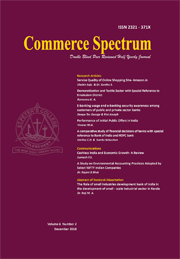Economic Impact of Tourism on the Host Community in Kerala
Author(s) : Dr. A. D. Rajeev Kumar, Dr. S.V. SudheerVolume & Issue : VOLUME 3 / 2015 , ISSUE 1
Page(s) : 14
Abstract
Kerala, a lush green strip of land located in the South West corner of Indian peninsula, enjoys a prominent place in the world tourism map. An assortment of tourist centres scattered over the different regions of the state has influence on the host population in terms of income and socio-economic development. Host community is bestowed with ample opportunities to generate economic benefits directly and indirectly from tourism. Business is the major activity available for the host community to get economic benefits directly from tourism. Even though host community engaged in tourism-related business is expected to derive economic benefits, they may not be economically benefited or the benefits available for them may not be sufficient enough in bringing improvement to their economic conditions. This necessitates the need for studying whether traders and businessmen belonging to host community is really benefited or not in economic terms. The question of whether these economic benefits have contributed for improving their economic conditions is also to be validated. The findings of the study endorse that host community engaged in various tourism-related businesses is economically benefited and these benefits make significant contributions in improving their economic conditions.
Keywords
Tourism, Host community, Discretionary income, Asset acquisition, Change in indebtedness
References
Akis, S., Peristianis, N., and Warner, J. (1996). Residents' attitudes to tourism
development: the case of Cyprus. Tourism Management, 17(7), 481-494.
Ashe, J. W. (2005). Tourism investment as a tool for development and poverty
reduction: The experience in Small Island Developing States (SIDS). Retrieved from http://www. tanzaniagate way.org/docs/tourism investment as a tool for development and poverty% 20 reduction.pdf.
Baker, K. (2008). Kerala's Strategy for Tourism Growth: A Southern Approach
to Development and Poverty Alleviation. In Burns, Peter M., and Novelli, Marina. (Eds.), Tourism Development: Growth, Myths and Inequalities (pp.192-216). Wallingford: CAB International.
Edward, Manoj., and Koshy, Moli P. (2007,December). Tourism Development
Initiatives and Challenges of Kerala. Southern Economist, pp.13-16
Fleischer, A., and Felsenstein, D. (2004).Short-Run Output and Employment
Effects Arising from Assistance to Tourism SMEs: Evidence from Israel, In Thomas, Rhodri (Eds), Small Firms in Tourism: International Perspectives
(pp.71-82). Oxford: Elsevier.
Frechtling, Douglas C. (1994). Assessing the Impacts of Travel and Tourism:
Measuring Economic Benefits. In Ritchie, Brent J. R., and Goeldner, Charles R. (Eds.), Travel, Tourism and Hospitality Research: A Handbook for Managers and Researchers (pp. 367- 392), 2nd edn. New York: John Wiley & Sons
GoK. (1986). A Master plan for development of tourism in Kerala (prepared by the Asian Institute of Development and Entrepreneurship). Thiruvananthapuram:
Department of Tourism, Government of Kerala.
GoK. (2011). Kerala Tourism Statistics, Thiruvananthapuram: Department of
Tourism, Government of Kerala
Heenan, David A., (1978). Tourism and the Community: A Drama in Three Acts.
Journal of Travel Research, 16(4), 30-32
Liu, J. C., and Var, T. (1986). Resident attitudes toward tourism impacts in
Hawaii. Annals of Tourism research, 13(2), 193-214.
Marzuki, A. (2008). Impacts of Tourism Development in Langkawi Island,
Malaysia: A Qualitative Approach. International Journal of Hospitality and
Tourism Systems, 1(1), 1-17
Milne, S. (1987). Differential multipliers. Annals of Tourism Research, 14(4), 499-515.
Murphy, Peter E. (1985). Tourism: A Community Approach. New York: Methuen Inc.
Sreekumar.T. T., and Parayil, G. (2002). Contentions and contradictions of
tourism as development option: the case of Kerala, India, Third World Quarterly,
23(3), 529–548. doi: 10.1080/0143659022013841 1.
Stoeckl, N. (2008). Enhancing the Economic Benefits of Tourism at the Local Level. In Moscardo, Gianna. (Eds.), Building Community Capacity For Tourism
Development (pp.16-28). Wallingford: CAB International.
Sudheer, S.V. (1993). Tourism: Problems and Prospects. Trivandrum: CBH Publications.
Tapper, R. (2001). Tourism and socioeconomic development: UK tour operators’ business approaches in the context of the new international agenda. International Journal of Tourism Research, 3(5), 351–366.
Vijayan, K. (2007). Tourism Development and Improvement of Local People at
Destination. (Ph.D Thesis, unpublished), University of Kerala.
.png)

